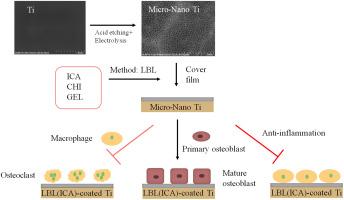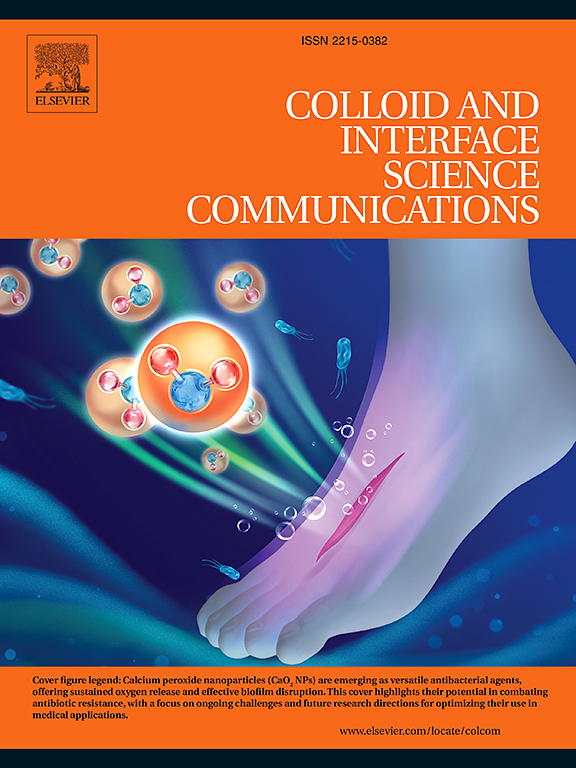沉积在微/纳米结构钛上的淫羊藿苷多层膜可促进骨生成并减轻糖尿病条件下的炎症反应
IF 4.7
3区 材料科学
Q2 CHEMISTRY, PHYSICAL
引用次数: 0
摘要
糖尿病患者的骨代谢紊乱和相关的炎症微环境使这一患者群体的骨折治疗变得困难。然而,钛植入物固有的生物惰性导致其骨结合能力不足,因此开发一种高效的表面改性策略以增强钛植入物在糖尿病患者中的骨结合能力非常重要。本文通过酸蚀刻和阳极氧化在钛上构建了微/纳米结构,然后利用逐层自组装技术在微/纳米结构钛表面添加了壳聚糖(CHI)、明胶(GEL)和冰片苷(ICA)的多层薄膜。表征结果表明,成功地在钛表面沉积了冰醋酸多层膜,并实现了冰醋酸的长期持续释放。细胞实验结果表明,在糖尿病条件下,改性钛表面的冰片素多层膜能促进成骨,抑制破骨细胞生成,减轻炎症反应。这项研究为治疗糖尿病患者的骨折提供了一种途径。本文章由计算机程序翻译,如有差异,请以英文原文为准。

Icariin-loaded multilayered films deposited onto micro/nanostructured titanium enhances osteogenesis and reduces inflammation under diabetic conditions
Disordered bone metabolism and the associated inflammatory microenvironment in diabetic patients make treating bone fractures difficult in this patient population. However, the inherent bioinert properties of titanium implants result in insufficient osseointegration, making it important to develop an efficient surface modification strategy to provide titanium implants with enhanced osseointegration capabilities in diabetic conditions. Here, a micro/nanostructure was constructed on titanium through acid etching and anodic oxidation, followed by an addition of a multilayered film of chitosan (CHI), gelatin (GEL) and icariin (ICA) onto the surface of micro/nanostructured titanium using a layer-by-layer self-assembly technology. The characterization results indicated that the icariin-loaded multilayered film was successfully deposited onto titanium surface and achieved a long-term sustainable release of ICA. Cell experiments showed that the icariin-loaded multilayered films modified titanium promoted osteogenesis, inhibited osteoclast generation, and reduced inflammatory reaction under diabetic conditions. This study provides an avenue for treating fractures in patients with diabetes.
求助全文
通过发布文献求助,成功后即可免费获取论文全文。
去求助
来源期刊

Colloid and Interface Science Communications
Materials Science-Materials Chemistry
CiteScore
9.40
自引率
6.70%
发文量
125
审稿时长
43 days
期刊介绍:
Colloid and Interface Science Communications provides a forum for the highest visibility and rapid publication of short initial reports on new fundamental concepts, research findings, and topical applications at the forefront of the increasingly interdisciplinary area of colloid and interface science.
 求助内容:
求助内容: 应助结果提醒方式:
应助结果提醒方式:


